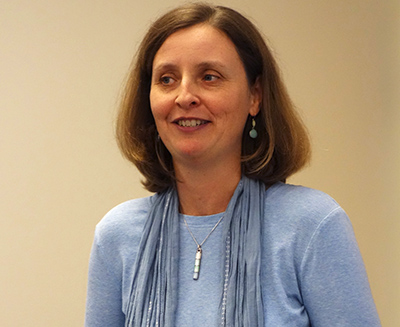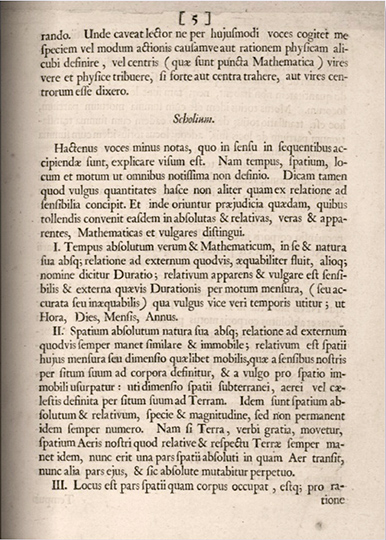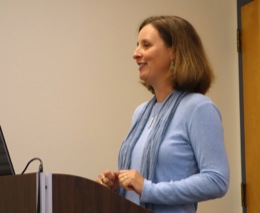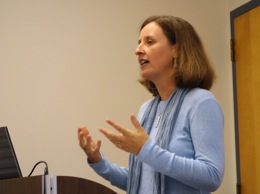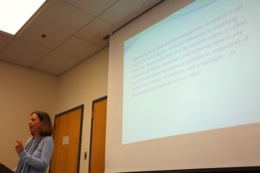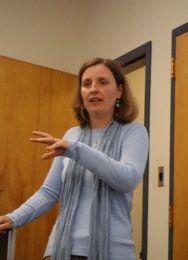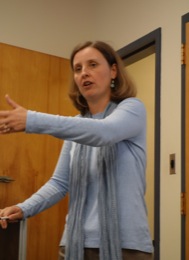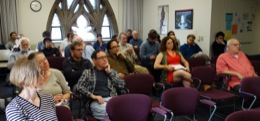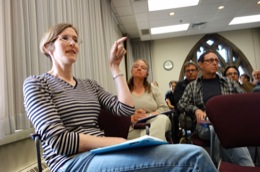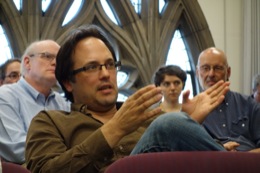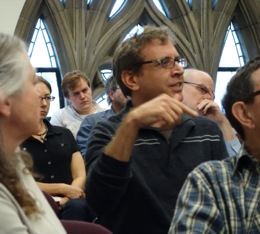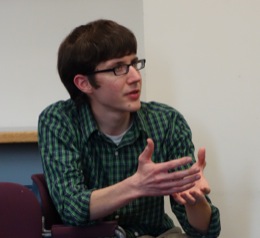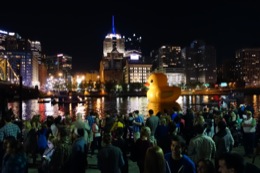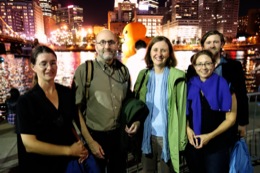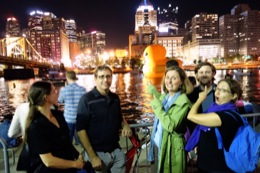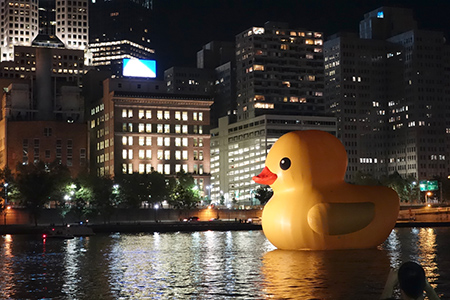
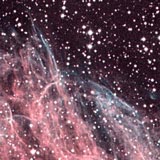
![]()
home
::: about
::: news
::: links
::: giving
::: contact
![]()
events
::: calendar
::: lunchtime
::: annual
lecture series
::: conferences
![]()
people
::: visiting fellows
::: postdoc fellows
::: resident fellows
::: associates
![]()
joining
::: visiting fellowships
::: postdoc fellowships
::: senior fellowships
::: resident fellowships
::: associateships
![]()
being here
::: visiting
::: the last donut
::: photo album
|
Newton and the Duck This afternoon's annual lecture series speaker is Katherine Brading. She's made the drive over from Notre Dame and is an especially welcome visitor. Notre Dame has one of the venerable programs in history and philosophy of science and has exercised a profound influence on the development of our field. She is now director of the program. I cannot imagine a surer hand to guide it onward. Her visit has been busy. For the past day or so, she's been popping in and out of the Center as she connects with old friends and makes new ones. Katherine has a broad range. She can walk you through the intricacies of symmetry principles and Noether's theorem in modern physics just as comfortably as she will point out hidden secrets in Newton's work and thought. This last exercise is the topic of today's talk. Like so many of us, she has been drawn back from the wonders of modern physics to the greater wonder of how this project could ever begin in the first place. As one traces back the threads, they lead inexorably to Isaac Newton. He changed things, and profoundly so, and in ways that are now so familiar that we take them for granted. But precisely what is the change? Many have tried to capture it. Katherine will tell us of her efforts. The story begins with Newton's famous scholium to the definitions in Book 1 of Principia. Newton contrasts "Absolute, True and Mathematical Time" with "Relative, Apparent and Common Time." Why does he list these three contrasts? Why three, when perhaps two or one might do? There is nothing superfluous in the list. Each has its purpose; each purpose is different; and Katherine proceeds to explain them clearly and thoroughly. It was a refreshing and informative experience. I admire the richness of modern Newton scholarship. However too often that richness passes over into baroque minutiae that are uninformative to me on the outside and, I suspect, of little use to anyone on the inside. Katherine found the balance between simplicity of exposition and accuracy of presentation. The drive to see Newton's immensely complex and subtle thought as a whole becomes overwhelming. It leaves mere consumers of Newton scholarship like me adrift. No firm mooring remains to which I can tie securely. What Newton did changed science; and his was good science that even today holds lessons for us on the best use of evidence. Is there no boundary to be found between that and Newton the obsessive heretic? Or, if there is no sharp boundary, can we find some separation? Katherine's answer came in the form of a simple but powerful idea. Our understanding of the nature of time, space and matter, prior to Newton, had been the subject of metaphysics. That means that it was developed in the time-tested philosophical process of analysis and debate. Whoever comes up with the most plausible account wins the day.
That, at least, is my dangerously over-simplified gloss of Katherine's account. Her formulation was more elegant and more careful; and it survived repeated challenges in question time of just the form that you would expect. "I want to understand better," the question begins in soft words the belie its real purpose, "just what you mean by 'empirical question'?" As the afternoon wore on, I'll admit that my head was wandering away from Newton to the duck. This was the day that a 40-foot yellow duck would be floated on the rivers downtown. It somehow seemed imperative that we go and look. I cannot now say just why it felt so important. Perhaps it derives from the same impulse that leads us make a formal presentation of an umbrella (with a very cool collapsible drip guard) to each speaker in the Center. Our tradition is to have a somewhat formal dinner after the Annual Lecture Series lecture as a way of marking the importance of the occasion. In the day preceding, I had been systematically working my way through its participants. Would they like to see a big yellow duck on the river...? Well, then we'll have to speed up the dinner a little so that we make it. The suggestion was welcomed uniformly. I think they liked the idea. But then the response was indistinguishable from how one reacts to a slightly deranged madman, babbling about a big yellow duck. It all went smoothly at first. We arrived at the restaurant earlier than usual and the waiter obliged by speeding up their normally leisurely service. Perhaps he preferred to usher a duck obsessed madman out the door sooner. I thanked him and promised to send his greetings to the duck. We were soon on the bus, heading downtown. As we neared what used to be the US Steel building, the smoothness roughened. It seemed we weren't the only ones interested in seeing the duck. I'd expected a few others. But just how many people care that much about a big duck? Very many, I now found. Our bus stopped, gridlocked in traffic. It wasn't just the duck. There was also the "Gallery Crawl" for which all the downtown art galleries open. And there is a huge night market filling the 6th Street Bridge overlooking the duck. After some negotiation, we decided to leave the bus and walk. With all the events downtown, it was hard work, making our way through the crowds. After quite a while, we made it across the Sixth Street Bridge over the Allegheny River to the northern bank. And there was the duck. I cannot speak for the others, but for me it was a moment of completion. John D. Norton
|
